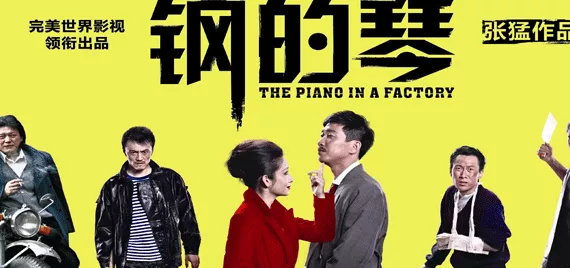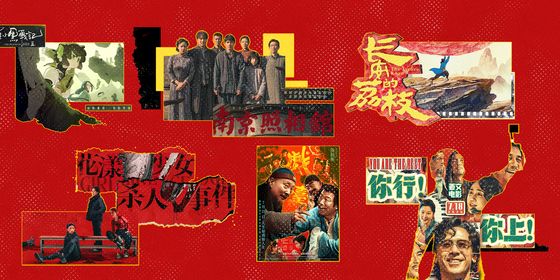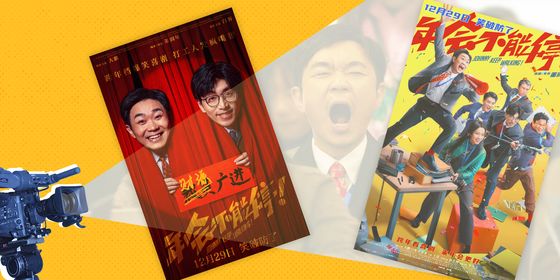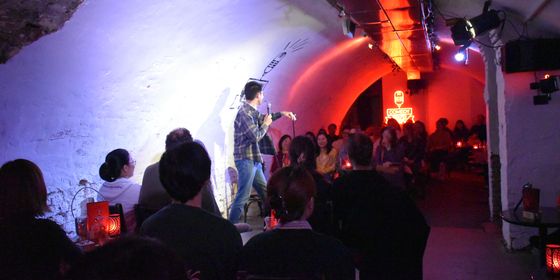A comedy about a father’s struggle to keep custody of his daughter – using a piano
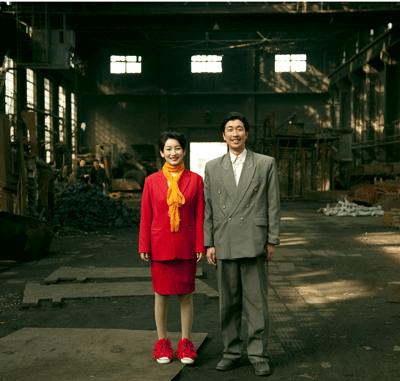 Returning to his northeastern homeland, where factories are torn into rubble and the unemployed greet one another with grim nods, Director Zhang Meng (张猛) tells the story of a man’s absurd mission to keep custody of his daughter. “The Piano in the Factory (钢的琴 Gāng de qín)” is a bittersweet comedy that has received awards and praise at film festivals around the globe. Northeast China was once a glorious bed of socialist industry now reduced to flat, grey suburbs. When the main character’s wife falls for a rich medicine salesman, she calls for divorce and the broken couple is faced with the question of who gets the daughter.
Returning to his northeastern homeland, where factories are torn into rubble and the unemployed greet one another with grim nods, Director Zhang Meng (张猛) tells the story of a man’s absurd mission to keep custody of his daughter. “The Piano in the Factory (钢的琴 Gāng de qín)” is a bittersweet comedy that has received awards and praise at film festivals around the globe. Northeast China was once a glorious bed of socialist industry now reduced to flat, grey suburbs. When the main character’s wife falls for a rich medicine salesman, she calls for divorce and the broken couple is faced with the question of who gets the daughter.
Zhang paints his now-barren birthland vividly through scenes tinted with sepiatoned colors. The film’s atmosphere is accentuated by the Eastern European folk sounds of the German acoustic band “17 Hippies”, whose music is eerily counter-pointed by the accordion the main character plays. This gloomy portrayal is the backdrop for one man’s convoluted struggle to find a piano and retain part of his family. It’s a story that reminds us that comedy doesn’t have to reduce characters to laughingstocks to be effective.
The movie opens with an expressionless Guilin Chen and his wife, XiaojFu, discussing their separation.
Xiaoju: Divorce is a two-way street. You cut me some slack and I’ll do the same for you.
Líhūn jiùshì xiānghù chéngquán, nǐ fàng wǒ yī mǎ, wǒ fàng nǐ yī mǎ de shì.
离婚就是相互成全, 你放我一马,我放你一马的事。
Guilin Chen: Divorce is divorce. Don’t talk rubbish! Let’s just find time to get it over with. The refrigerator, the TV, the washing machine, take whatever you want.
Líhūn jiùshì líhūn, bié chě nàxiē méi yòng de……nà jiù chōukòng bànle ba, jiālǐ bīngxiāng, cǎidiàn, xǐyījī nǐ kànzhe bān ba.
离婚就是离婚,别扯那些没用的……那就抽空办了吧,家里冰箱、彩电、洗衣机你看着搬吧。
Xiaoju: You think I’m a junk collector?
Nǐ shì bù bǎ wǒ dàngchéng shōu fèipǐn dele?
你是不把我当成收废品的了?
Guilin Chen: I almost forgot, you’ve struck it rich now.
Wǒ chà yīdiǎn wàngle, nǐ xiànzài fùyùle.
我差一点忘了,你现在富裕了。
Xiaoju: But I’m taking Xiaoyuan … I tell you, my daughter can’t be happy with you.
Dànshì, xiǎo yuán wǒ yào dài zǒu……wǒ gàosu nǐ, hái zǐ gēn nǐ shì bù xìngfú de
但是,小元我要带走……我告诉你,孩子跟你是不幸福的。
Guilin Chen: Stop playing the happiness card to intimidate me!Xiaoyuan is very happy.
Nǐ shǎo ná xìngfú xiàhu wǒ, xiǎo yuán hěn xìngfú
你少拿幸福吓唬我, 小元很幸福。
To maintain the custody of his daughter, Guilin Chen agrees to cultivate her artistic talent by buying her a piano—an expensive gift, especially for an unemployed father. The singer Shuxian (淑娴), who pursues a “platonic” romance with Chen Guilin, suggests an inexpensive alternative:
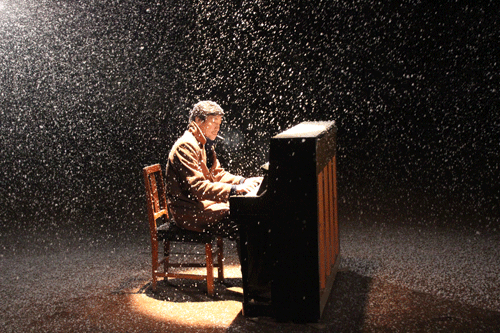
Shuxian: Look what I’ve chosen for my kid—calligraphy. I just get him a brush and some paper, that’s it. Hassle-free and it doesn’t cost anything, except some old newspapers.
Nǐ kàn wǒ gěi háizi xuǎn de zhè fāngxiàng: Shūfǎ. Ná gēn bǐ nòng diǎn zhǐ jiù wánliǎo. Yòu shěngshì yòu bù fèi qián, jiù fèi diǎnpò bàozhǐ
你看我给孩子选的这方向:书法。拿根笔弄点纸就完了。又省事又不费钱, 就费点破报纸。
But Chen remains steadfast in his determination to get his daughter, Xiaoyuan, a piano and make up for his own failed talents and aspirations.
Guilin Chen: My father named me Guilin, hoping I would become like the scenery in Guilin—the best in the world. But I didn’t make it; I just got halfway. So I must have her learn piano.
Wǒ diē gěi wǒ qǐ zhège míng chén guìlín, jiùshì xīwàng wǒ néng xiàng guìlín shānshuǐ yīyàng jiǎ tiānxià. Jiéguǒ méi jiǎle nòng jiāshēngle. Suǒyǐ, wǒ bìxū ràng xiǎo yuán xué gāngqín.
我爹给我起这个名陈桂林, 就是希望我能像桂林山水一样甲天下。结果没甲了弄夹生了。所以, 我必须让小元学钢琴。
Shuxian: To fulfill your own dreams?
Yuánmèng a?
圆梦啊?
Guilin Chen: If Xiaoju takes her, what will I have left to fulfill?
Xiǎojú yàoshi bǎ tā dài zǒuliǎo. Wǒ hái yuán gè pì a?
小菊要是把她带走了。我还圆个屁啊?
Guilin Chen gathers some of his closest friends and co-workers to help. Northeastern men are renowned for their abuse of alcohol and Guilin Chen urges on his friends with a couple of proverbs: “No one leaves sober” (不醉不归 Bù zuì bù guī) and “The amount of booze you down shows how much you can achieve” (能喝多少酒就能干多大事 Néng hē duōshǎo jiǔ jiù nénggàn duō dàshì). Then he asks them to help him find a piano. No one can lend him money, but everyone is ready to do whatever they can.
The men sneak into a local school to steal a piano, but the instrument is too heavy and they are caught by a guard. Despite the broad comedy, Director Zhang Meng exploits the scene for a poetic moment, with Chen playing “Fur Elise” on the abandoned piano as snow carpets the school’s courtyard.
Still, Guilin Chen doesn’t give up. When the old smokestacks of the foundry—the symbol of the district—are under threat of demolishment, he is hit with an absurd idea that perfectly captures his sense of disillusionment:
“What use is a petition? No one will listen to a few old workers. If you want to keep them from being demolished, you have to give them a perceived value like two gold bars. Turn them into two missile silos or rocket launchers, or even two abstract chopsticks; then you’ve got a worthwhile tourist attraction. That’s got value, so no one would demolish them.”
Liánmíng xiě xìn yǒuyòng ma? Bù kěnéng tīng nǐ zhè jǐ gè lǎo zhígōng de……nǐ yàoshi xiǎng jiào zhè liǎng gēn yāncōng bù bèi zhà, nǐ jiù de jiào rén kàn dào zhè bùshì liǎng gēn yāncōng, zhè shì liǎng gēn jīntiáo…… Nǐ bǎ zhè liǎng gēn yāncōng gǎizào chéng liǎng kē dǎodàn chuō zài nà, huòzhě shì gǎizào chéng liǎng gè chángzhēng yī hào huǒjiàn fàng zài nà’er. Nǐ nǎpà nòng chéng chōuxiàng de liǎng gēn kuàizi ní, nà yěshì yīgè liànglì de fēngjǐngxiàn a. Nǐ yǒu jiàzhí, tā jiù bùnéng bèi zhà.
联名写信有用吗? 不可能听你这几个老职工的……你要是想叫这两根烟囱不被炸, 你就得叫人看到这不是两根烟囱, 这是两根金条……你把这两根烟囱改造成两颗导弹戳在那,或者是改造成两个长征一号火箭放在那儿。你哪怕弄成抽象的两根筷子呢,那也是一个亮丽的风景线啊。 你有价值,它就不能被炸。
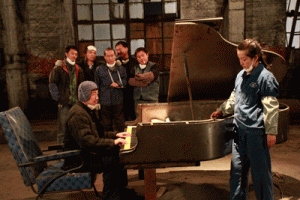 The smokestacks are eventually demolished and Guilin Chen and his friends decide to build a piano in their old factory, despite doubts expressed by Shuxian:
The smokestacks are eventually demolished and Guilin Chen and his friends decide to build a piano in their old factory, despite doubts expressed by Shuxian:
“Make a piano, what a huge job! A steel factory is not a piano factory.”
Zào gāngqín nà de shì duōdà de shìyè. Gāng chǎng hé gāngqín chǎng kànzhe shì jiù chà yīgè zì.
造钢琴那得是多大的事业 。钢厂和钢琴厂看着是就差一个字 。
The friends persist through more absurd trials and tribulations, remaining united under the old-fashioned slogan: “We workers can do anything if we put our minds to it” (没有敢想敢干敢拼的精神,那不是我们工人干的事儿 Méiyǒu gǎn xiǎng gǎn gàn gǎn pīn de jīngshén, nà bùshì wǒmen gōngrén gàn de shì er).
Eventually the piano is built. As young Xiaoyuan fills the factory with music, everyone realizes how silent their home has become. More charming than laugh-out-loud, “The Piano in the Factory” observes that when difficult situations arise, comedy can recount the struggle powerfully, completely avoiding—and surpassing—overt sentimentality.





